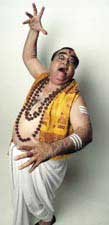Life
Hell Of A Party

Where's the Party Yaar is a romp through Indian America.
|
“Indians love to party. That’s how we meet people,” says Sunil Thakkar, putting a dent in the image of the model minority in button down shirts interested only in studiously writing lines of code and dreaming of the next IPO. Thakkar should know – he has his finger on the pulse of the desi party scene in Houston. And now he has a film to prove it. Thakkar is producer and co-screenwriter of Where’s the Party Yaar? (WTPY) currently making its way through America after releasing in Chicago and Houston in September.
It’s a romp through Indian America, starring American Desi’s Sunil Malhotra and Kal Penn. But it’s based on Thakkar’s own experiences of running desi parties in Houston. Along the way it tries to skewer every sacred cow it can find – from astrologers, to the Hindi love song in the rain, to the eternal tussle between ABCDs and FOBs. According to the website for Where’s the Party Yaar? Sunil Thakkar’s favorite past time when he lived in Bombay was scouting the Juhu area for all the film star bungalows. After 16 years he saw Amitabh Bachchan standing outside his house smoking bidis. He immediately started “Star Tours” and took newly arrived villagers star gazing for a nominal fee of Rs. 85. This business was booming until a local “bhai” showed up at his house wanting a cut of the profits. Sunil’s mother decided to send him out of harm’s way to the United States to pursue higher education. “Umm well that’s not quite how it was,” admits Thakkar on his cell phone as he gets on the freeway heading to Florida to screen Where’s the Party Yaar? at a South Asian Students Association meet in Orlando. “I was just this quiet, simple kid who used to stammer,” he says. His career track was anything but wacky. He came to the United States to study engineering in Ohio and then went on to do his MBA from Rice University in Texas. For a shy Indian boy, the United States was both an exciting place as well as a disorienting one. It sent him hurtling towards his own culture. “I got into doing garba ras and really loved it. I’d never done it in India,” he recalls. Before long he was emceeing shows, mimicking the likes of Amitabh Bachchan and started his own radio show in 1993 – Music Masala – a hotchpotch of humor, Bhangra and Bollywood gossip.
That’s when Thakkar tuned in to the fact that desis loved to party, but they were ill at ease in the American party scene. Music Masala started throwing big desi dance parties in Houston with hundreds of people jamming to the latest bhangra hits and desi remixes. Thakkar started noticing the conflict between the ABCDs and the FOB immigrants. “It was a constant battle of too few women and too many FOBs doing their hoye hoye dance moves,” he says candidly. Women would come and say “Too many FOBs, yaar.” As a business owner, Thakkar saw he had a problem on his hands. “You need a good mix.You need cool guys and hot chicks for a party to build a reputation, not just a lot of software engineers from Kerala or Andhra. This is business.” Things came to a point where someone would call Music Masala and ask “Hey, where’s the party, yaar?” they would go “Party, what party?” And if that failed there were lots of other little roadblocks. “If we saw 3 or 4 guys together, we would stop them and say ‘Sorry, party packed.’ Or have a dress code: no funny sneakers allowed,” admits Thakkar. The experiences gave Thakkar and co-writer and director Benny Matthews the idea for the film. He knows it’s not politically correct and some will say it smacks a little bit of self-hate – desi parties claiming to be too good for desis! Thakkar says he understands. “These are good people. I am an FOB myself,” he says. “When I came here I was a total geek. People had to tell me ‘Sunil, you need deodorant.'” That’s why when he made WTPY, he wanted an FOB like him to be its hero. He even cast himself in the small role of Shyam Sunder Balabhadra-patramukhi, an FOB in search of the ultimate desi party. “FOB has a bad connotation that ABCD doesn’t necessarily have. I wanted Hari, an FOB to be the hero,” emphasizes Thakkar. But as a businessman, he also knows that too many desis freshly liberated from the claustrophobic embrace of the family in India can get a little too rambunctious in a club. “People would get drunk, break into fights. That gives parties a bad rep,” he claims. In the film Hari Patel shows up in Houston into the arms of the Bakshi family. Their son Mo belongs to the Rho Beta Rho fraternity, promoter of the coolest desi parties on campus. The promoter Ray’s mission in life is to keep too many FOBs from crashing the party. But Hari thinks the girl of his dreams will be there. Does Hari find out where the party is? It’s the slightest of plots, but Thakkar tries to use some wacky humor to take potshots at the Indian American experience in a way not too many people have.
Unlike most immigrant films, the America Hari Patel arrives into is not the America of the Smiths and Jones. It’s made of Bakshis and Singhs. “This is what Houston looks like,” stresses Thakkar. “There is a Raju panwallah here. I get gas at an Indian gas station. I can get my groceries from an Indian store and then stop for some sugarcane juice or a dosa. I am living a cool part of India in America but it’s a life I didn’t have back home.” Some people think of this as urbanized ghettos. Others will claim a film like WTPY can never cross over to a wider audience because it’s so specific to the Indian American experience. But Thakkar points to the reviews since the film officially released in September after doing the rounds at festivals in Austin, Toronto, San Francisco and Dallas. “A witty assimilation comedy” chortles the Austin Chronicle. It “discretely dismantles caricatures of FOBs with deft send-ups of stock Bollywood leitmotifs,” says the Village Voice. However the Los Angeles Times complains the film is “too corny and drawn out to appeal to crossover audiences but may strike a nerve in Indian communities.” Thakkar says he can only he honest about what he knows. The reality of immigration into areas like San Jose and Houston and New York is simply this. Whole neighborhoods are becoming little Indias, absorbing the new waves of immigrants. But in the process everyone gets changed. Though the panwallah and the video stores with pirated copies of Bollywood blockbusters might look familiar, it’s not home. Its an Americanized version of our imagination of what home is. “The America we are coming to is not white America. It is Indian America, but the way they conduct life and business is totally different as well,” says Thakkar. So in WTPY, Hari has a few lessons to learn about what being American means, and his cousin Mo has a few lessons of his own to learn about what his roots are all about.
Despite their differences, Thakkar realizes that whether they are ABCDs with gel in their hair and Banana Republic black turtlenecks, or FOBs in oh-too-white sneakers and checked shirts from the sale rack at Target, everyone wants to have fun. So now he is taking the party on the road. “When you host a big party in Houston, only people from Houston can come,” he says. “So why not have one on a big boat and invite people from all over the United States.” That’s how Thakkar and his friends came up with the idea of the Masala cruises. “Like the one that went from Miami to the Bahamas. The next one heats up the glaciers of Alaska in 2004. It’s just like an ordinary cruise except you have desi food, desi entertainment and DJs.” And yes, you even get to see WTPY. Talk about a captive audience! But what’s most important about the cruises says Thakkar is that everyone gets to go. Families with small kids, teens, singles, families with their parents from India. “And they get to have a comedy night and Bollywood night and dandiya, all the things they like but can’t get on other cruises.” He claims the idea is catching on. The first cruise had about 470 people. The next one had 750. He’s hoping to do even better the next time. But whether its Masala cruises or WTPY, Thakkar aims to be Indian in America and have a lot of fun doing that. He knows the immigrant experience is no picnic. He knows about hate crimes and exploitation of H1-B workers and the Patriot Act. WTPY itself came face to face with that when post 9/11 they lost permission to film Hari’s coming-to-America scene at the airport. But he doesn’t want his film bogged down in politically correct mantras and activism. His aim is to keep his film honest and fun and “real, real, real.” And have fun with his friends while doing it. The executive producer is his wife Sandhya. The director and co-writer is his good friend Benny Mathews. Sunil Thakkar wants to show that with the right gang you can always be carrying a bit of Bombay with you whether you live in Houston or Boston.
And that’s amply clear over the phone. “Hold on.” says Thakkar. “We are coming to a Taco Bell and need to get something to eat.” The Music Masala gang is trying to come up with their hot tips on how to shed the FOBness. “Stop levitating on toilet seats” shouts one. “Stop picking your teeth with business cards” suggests another. But as they pull up to the counter and Thakkar starts giving the order you realize Sunil Thakkar has never lost touch with his desi roots. “Nachos supreme without meat, tostadas and lots of hot sauce. Extra hot sauce,” he bellows. Then he adds “Just water, no ice. And oh more hot sauce please.” |





